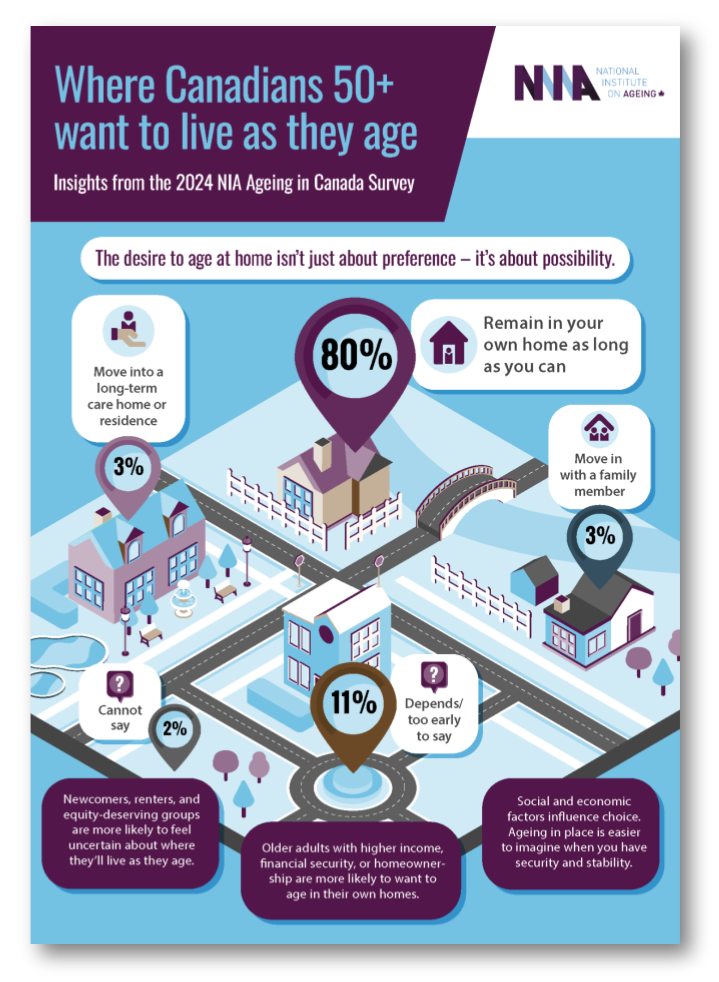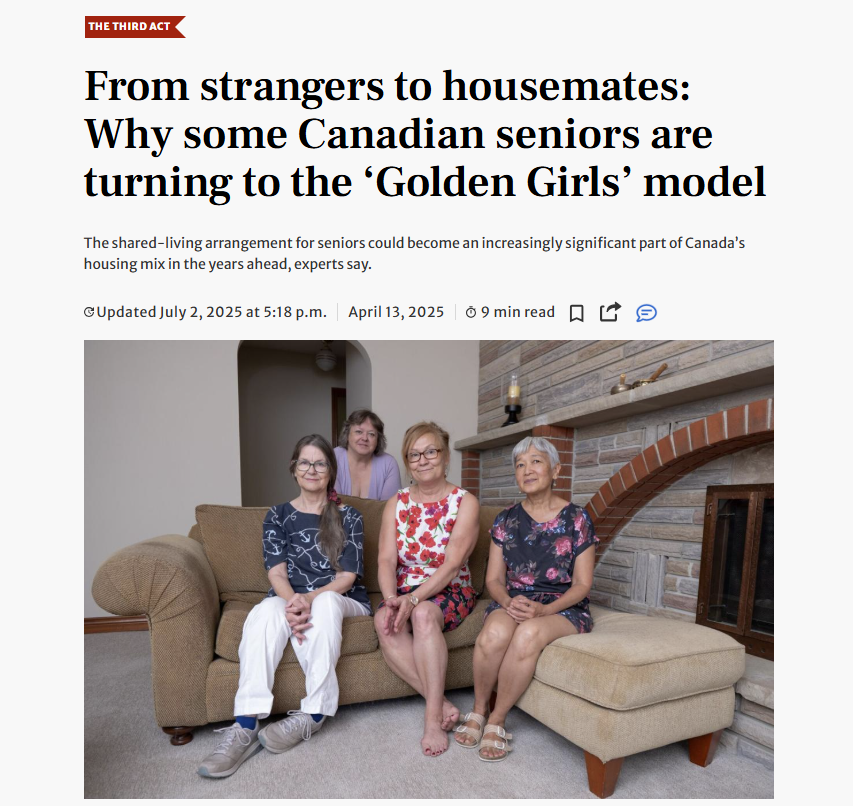|
|
Friends of the National Institute on Ageing,
For this July edition of the newsletter, we’re offering a few longer-form commentaries that respond to headlines on vaccine availability and the link to healthy ageing, poverty and affordability among older women in Canada and the crisis in retirement security. Together, these pieces reflect the breadth of our work at the NIA and preview some exciting Fall outputs.
Other highlights in this issue include:
New data visualizations on where Canadians want to age—and the barriers standing in their way.
Journalism on Ageing Project Award Winner Megan O’Toole’s piece on the “Golden Girls” shared living model for older women.
A thoughtful video message from 95-year-old Ivan Muller on rethinking retirement with purpose.
As always, thank you for staying engaged with our work. Together, we are building a Canada where older adults feel valued, included, supported and better prepared to age with confidence.
Warm regards,
Mark Hazelden
Executive Director (Interim)
National Institute on Ageing
|
|
|
|
|
When Public Health Takes a Step Back, Older Adults Pay the Price |
|
|
As Canadians enjoy the warmth and relaxation of summer, public health officials across the country are already preparing for the next cold and flu
season. Everywhere, that is, except in Alberta, where the government is rolling back its COVID-19 vaccine requirements and coverage for older persons and health care workers and softening its stance on immunization in general. This move has prompted many health experts to sound the alarm, particularly regarding the province’s older residents.
Unfortunately, the situation in Alberta highlights the persistent fragmentation of Canada’s vaccine landscape. While every other province and territory in Canada so far continue to offer free, evidence-based protection against COVID-19 to their more vulnerable residents, Alberta’s decision to offload the costs ($110 per vaccine) onto individuals could have life-threatening consequences, especially for older adults on fixed incomes.
The risk of hospitalization for severe illness and death from COVID-19 is significantly higher among older adults, with those aged 60 years and older accounting for 92% of Canada’s COVID-19 deaths to date. Age-related changes like decreased lung capacity and immune function make older adults particularly susceptible to complications from preventable diseases.
Vaccines are not just a personal health choice—they are essential tools for preventing severe illness, hospitalization and death in the populations most at risk.
|
|
|
|
|
Commentary: Why Canada Needed the Pension Centre of Excellence—and Why It’s Finally Here
By Dr. Bonnie-Jeanne MacDonald, Co-Lead, Pension Centre of Excellence; Director of Financial Security Research, National Institute on Ageing
|
It’s not often that you can clearly recognize the start of something with the potential to shape the future—but that’s exactly what it felt like standing in front of our colleagues, partners and friends at the inaugural Symposium of the Pension Centre of Excellence (PCE) at the National Institute on Ageing. The PCE is a new, non-partisan, research-informed and action-oriented knowledge exchange platform dedicated to improving the retirement financial security of Canadians at the National Institute on Ageing.
While it was a celebration of a new forum, this gathering also marked the culmination of something much deeper: a shared recognition that Canada’s retirement income system—a system touching nearly every person in the country—needs a dedicated space for research, evidence, collaboration and coordinated action. And now, thanks to the unwavering support of 31 founding member organizations, we have that space.
Together, we’ve taken something that used to fall between mandates and made it everyone’s shared mission: a financially secure and dignified retirement for all Canadians.
|
|
|
|
|
 |
Shining a Light on Inequality: Older Women and the Urgent Need for Targeted Policy |
|
|
Gabrielle Gallant, Director of Policy, recently addressed an international audience as part of the United Nations’ 2025 High-Level Political Forum. She shared findings from the NIA’s work on economic insecurity among older adults, with a focus on the experiences of older women.
While official estimates suggest that 6% of older Canadians live in poverty, the NIA’s Ageing in Canada Survey offers a more detailed and human-centred view using the Material Deprivation Index. This measure captures lived experiences of financial insecurity, beyond just income levels—and it revealed something striking: 15% of older Canadian women (and 13% of older men) are struggling. These rates are more than double the official poverty estimates.
Gallant highlighted that fewer older women can save for retirement compared to men and fewer feel confident they’ll be able to retire when they’d like to. Among the most vulnerable are single, racialized older women who rent their homes—a group facing the compounded impact of systemic inequality across a lifetime.
“A lifetime of inequality does not disappear in old age,” Gallant reminded the audience. “We see the lasting effects of lower earnings, unpaid caregiving and time spent out of the workforce play out in stark terms later in life.”
The remarks underscored the importance of making older adults—and especially older women—visible in all efforts toward achieving the UN’s Sustainable Development Goals. Without targeted, inclusive policy action, we risk reinforcing the very inequalities we aim to eliminate.
The NIA thanks HelpAge Canada, International Longevity Centres Canada and Canada’s Permanent Mission to the United Nations for convening this vital conversation.
|
|
|
|
|
 |
|
|
Ageing in the Right Place Isn’t Just a Matter of Preference — It’s a Matter of Possibility. |
A new data visualization from the NIA’s Ageing in Canada Survey shows that most Canadians want to age in their own homes, but recent immigrants, renters and equity-deserving groups are more likely to feel uncertain about where they’ll live as they age. Meanwhile, older adults with higher income, financial security, or homeownership are far more likely to say they want to age at home.
Why? Because stability matters. Housing and financial resources shape not only what people want, but what they believe is possible.
If we want to support ageing in the right place for everyone, we need to address the barriers that stand in the way. That means building systems and communities where people can age with choice, dignity and confidence.
|

|
| Download the Infographic
|
|
|
|
|
 |
|
|
Lessons from Abroad — Comparing Long-Term Care in Canada and Australia |
As both Canada and Australia work to strengthen their long-term care systems in response to ageing populations, a new report led by Dr. Anna Grosse, NIA Fellow Dr. Kristina Kokorelias and Dr. Samir Sinha explores what the two countries can learn from each other. Through an environmental scan of publicly available literature, the authors examine key differences in governance, care delivery and workforce sustainability. While Canada places greater emphasis on in-home care and Australia relies more on residential care, both countries face similar challenges. The findings featured in the Journal of Long-Term Care offer valuable insights for shaping
policy, improving practice and guiding future research in long-term care.
|
|
|
|
|
 |
|
|

|
|
|
Journalism in Ageing Award Winner |
|
|
The NIA and Toronto Star proudly spotlight Megan O’Toole as the second recipient of the Journalism in Ageing Project award. This story is part of The Third Act, a partnership between the Toronto Star and the NIA since 2023.
An award-winning investigative and data journalist, Megan brings nearly two decades of global reporting experience—from conflict zones and refugee crises to issues of environmental justice and Indigenous rights. Her work has earned multiple accolades, including two Amnesty International awards.
Megan’s feature explores the growing trend of older Canadian women embracing shared living—known as the “Golden Girls” model—as a solution to rising housing costs, loneliness and a desire to age in place. Through the stories of four women in London, Ontario, her article offers a compelling look at how community, compromise and cohabitation can create a sense of belonging in later life.
|
|
|
| Read Megan's Story in the Third Act Series
|
|
|
|
|
 |
|
|
Roadmap for Retirement: The Case for a National Pension Dashboard
As retirement planning grows more complex, many Canadians struggle to track their future income. In this C.D. Howe Institute E-Brief, Kathryn Bush proposes a national pension dashboard—a secure, government-backed tool to consolidate public benefits, workplace pensions and personal savings. With models in countries like Sweden and Australia, Canada has an opportunity to help individuals plan more confidently. Read more.
Ageing in a Vertical City: Recommendations for the City of Toronto’s Third Seniors’ Strategy
Read the new report launched by the NORC Innovation Centre at University Health Network (UHN) in collaboration with the School of Urban and Regional Planning at Toronto Metropolitan University.
Colorectal Cancer Canada Survey
Colorectal Cancer Canada is inviting Canadians aged 50 to 74 who have never been diagnosed with colorectal cancer (CRC) to participate in their Using a FIT for Colorectal Cancer Screening Behaviours in Canada Survey. To show their appreciation for your time, you can get a chance to win 1 of 10, $25 Amazon e-Gift Cards upon completion.
Use of new medications for Alzheimer’s disease in the Canadian health care system
The Canadian Consortium on Neurodegeneration in Aging (CCNA) developed a new webpage. Learn more about new medications for Alzheimer's Disease in Canada. For in-depth content, see also this webinar recording.
Policy Pathways Post-Conference Summary: Ageing Canada 2040
On May 13, 2025, CSA Group hosted its second Policy Pathways Conference, bringing together close to 200 cross-sector participants to explore the future of ageing. Conference sessions focused on the health and wellbeing of Canadians as they age and the impacts of ageing on Canada’s economic outlook. Read the post-conference summary report here.
A Call to Action: Ivan Muller on Rethinking Retirement and Ageing with Purpose
In a powerful and heartfelt video message, 95-year-old Ivan Muller—resident of V!VA Retirement Community in Vaughan—shares his personal reflections on growing older in Canada.
Ivan's message is a call to action for all of us: to reimagine retirement as a new chapter, not an ending. He challenges governments and communities to go beyond basic care and create environments where older adults can thrive—through continued work, learning, creativity and connection.
We invite you to watch Ivan’s compelling message and join the conversation about how Canada can better support purposeful ageing for all.
Watch his video here!
|
|
|
 |
|
|
Sector Events: |
|

|
|
|
|
|
|
|
|
|
|
|
TMU National Institute on Ageing Fund |
Help create a Canada where older adults feel valued, included, supported and better prepared to age with confidence by making a charitable gift to the TMU National Institute on Ageing Fund today. Gifts to the TMU National Institute on Ageing Fund make a tangible impact on the future of ageing in Canada. You choose the amount. You make the difference. Donate now!
|
|
| DONATE TODAY!
|
|
|
|
|
|
|